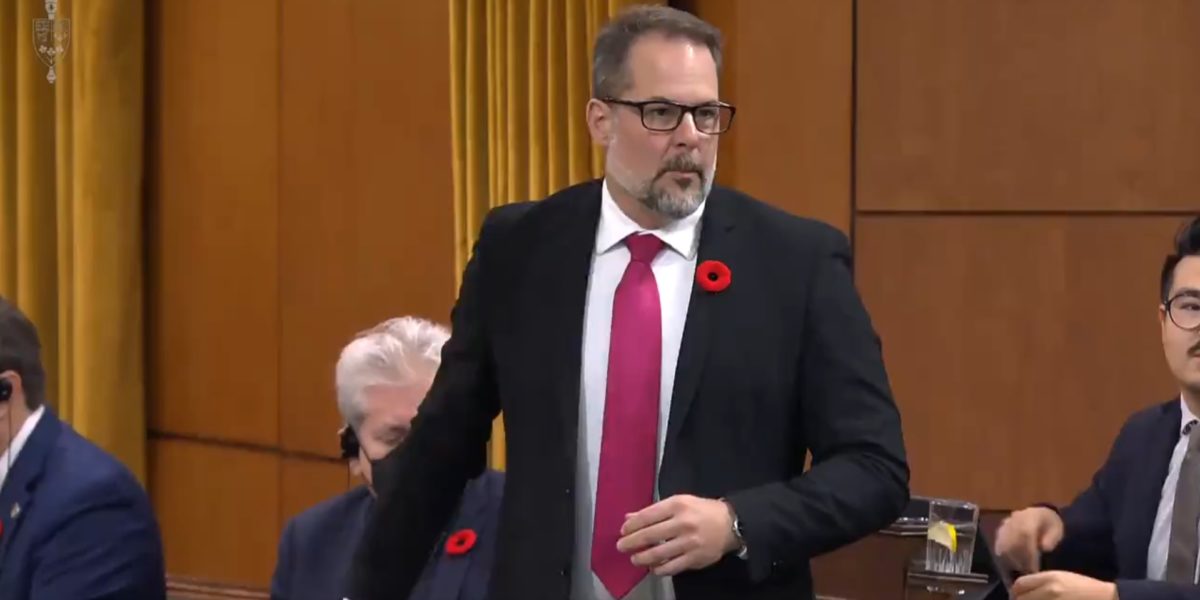If new anti-scab legislation from the NDP were to become law, employers could no longer use replacement workers during a lockout or strike in federally regulated workplaces.
The bill, introduced last week by NDP labour critic Alexandre Boulerice, comes as the federal government is participating in consultations on a similar type of ban. Anti-scab legislation is a key element of the NDP’s supply-and-confidence agreement with the Liberal government, and Boulerice’s bill sends a clear signal that the New Democrats are done waiting.
Speaking to reporters last Thursday, Boulerice outlined the party’s vision for the federal government to prohibit employers and corporations from using replacement workers while unionized staff are on strike, both in-person and virtually.
“The NDP has a long and strong history to defend workers rights and we think it’s about time to have anti-scab legislation at the federal level,” he said, adding that it will help balance the playing field for employees during a dispute, conflict, or collective agreement. “It’s important not to have replacement workers that are taking the jobs of people who are exerting their rights to defend their working conditions and their lives.”
Cleaning the code of scabs
Bill C-302, formally known as An Act to amend the Canada Labour Code (replacement workers), follows the idea that scabs “prolong strikes and lockouts and give the employer little incentive to reach a fair deal.”
It’s not the first time the NDP has tabled a bill like Boulerice’s, in fact, they’ve introduced several of them over the years.
While Boulerice referred to his bill as the “NDP’s vision,” he acquiesced that the eventual legislation will likely be tabled by the Minister of Labour.
Boulerice was joined by the vice-president of the Canadian Labour Congress (CLC), Larry Rousseau, who pointed out that the CLC represents over three million workers in every sector of the economy.
“The CLC fully supports this legislation, which will create a fairer collective bargaining process by prohibiting the use of scabs during a labour dispute,” Rousseau said. “Our members across the country work hard and they play by the rules. They deserve the right to stand up together and fight for respect and better working conditions.”
While the legislation is a start, Rousseau went on to say that, “in any labour dispute, giant multinational corporations already hold most of the cards.” He pointed out employers can leverage unionized staff through acts like stockpiling inventory and overworking employees, or shifting production to other sites and putting the entire team out of work.
Bill would help level playing field
“A labour dispute may put a dent in company profits but employees stand to lose everything — their savings, their jobs, their house, and their union,” Rousseau said.
While a timeline for anti-scab legislation remains up in the air, the supply-and-confidence agreement stipulates that a bill needs to be introduced by December 31, 2023.
Bill C-302 comes as tens of thousands of Canadian workers find themselves on picket lines after failing to reach contract agreements with provincial governments.
In Ontario, 55,000 educational workers represented by the Canadian Union of Public Employees (CUPE) are poised to walk off the job on Friday, November 4 after Premier Doug Ford invoked the notwithstanding clause to force workers off the picket lines.
The strike-ending move by Ford not only ends the negotiation process through legislation that imposes a new contract for workers, it also criminalizes the ability for unionized staff to strike, with individuals facing possible fines of up to $4,000 per day, or $500,000 per day for CUPE itself.
“This is an appalling display of contempt for workers’ rights, for the collective bargaining process, and for the workers who look after our kids and keep our schools running,” CUPE National President Mark Hancock said in a Monday release. “Going full nuclear and threatening the lowest-paid education workers in the province with fines and the Notwithstanding Clause is just disgraceful, even for this premier and this education minister.”
Calling on the Ford government to negotiate, not legislate, Hancock added that Ford’s threats and intimidation won’t stop CUPE from fighting for workers rights. CUPE Ontario President Fred Hahn said in an interview with rabble.ca that regardless of Ford’s use of the notwithstanding clause, his educational support workers will be on the picket lines on Friday if a deal is not reached.
Meanwhile in N.S., 1,500 part-time instructors, teaching assistants and markers represented by CUPE are also on strike as average wages remain significantly less than other post-secondary institutions across Canada.
It’s a similar story for early childhood educators, outreach workers, and student support workers represented by the Nova Scotia Government and General Employees Union (NSGEU), who are currently on strike in the Annapolis Valley fighting for wage parity with other school districts in the province.
“MLAs are paid the same base salary no matter where they are from, why shouldn’t school support workers be paid the same, as well?,” the NSGEU asked in a Tuesday release. “The Minister [of Education] must explain why she feels like workers in her own riding are worth less than those working elsewhere in Nova Scotia.”
The NDP’s bill to stop the use of scab workers had its first reading in the House of Commons on October 27.



